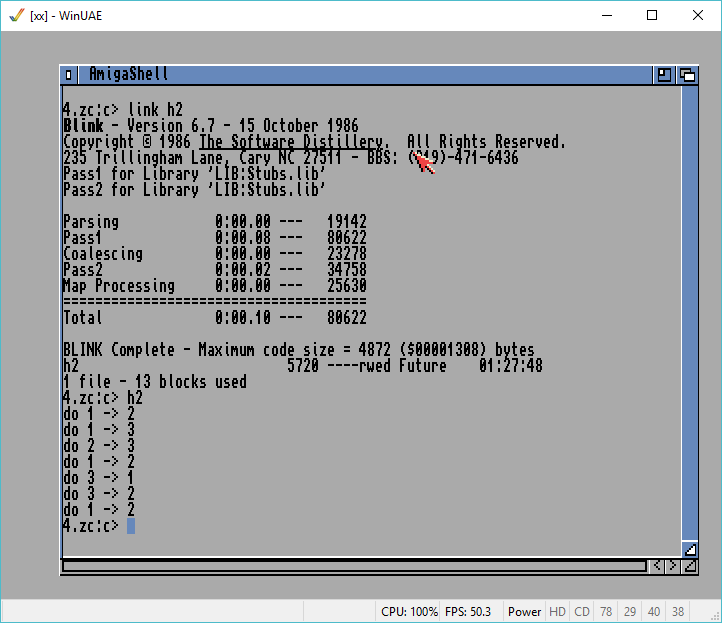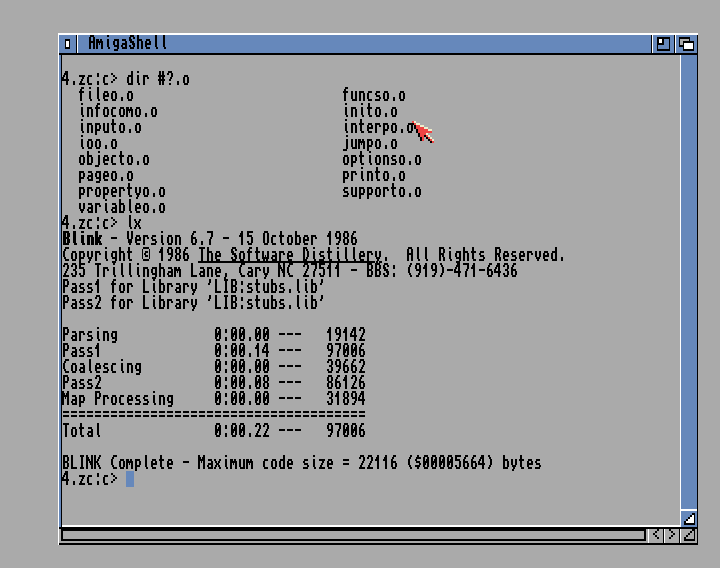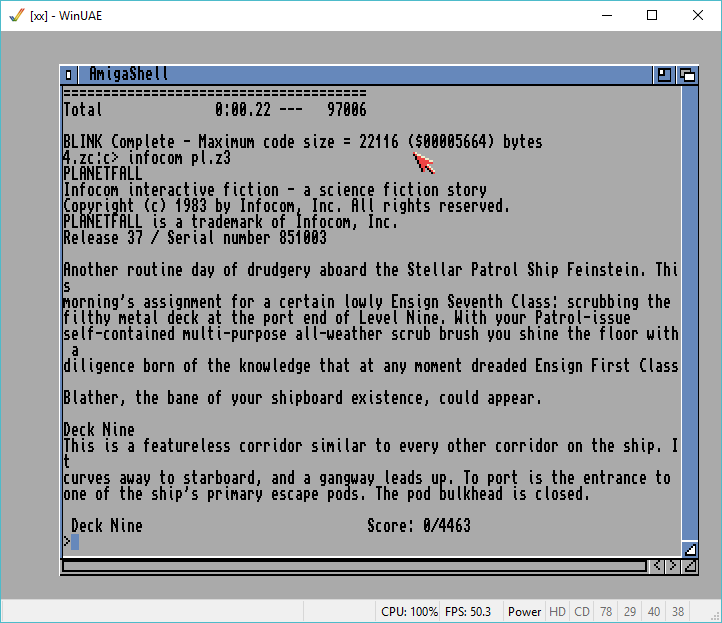To start this fun voyage, I used HCC, the first usable port of Sozobon C to the Amiga I could track down. From it’s description:
Amiga port of Sozobon, Limited’s C Compiler. Can completely compile itself, supports 32 bit ints, and optimizer can ‘registerize’ variables. Includes compiler, optimizer, tool for creating interface code for Amiga system calls, startup code, C library, include files, and library routines that work with Motorola FFP format. Uses assembler A68k, linker BLink, and provided run-time shared C library CClib.library.
From the readme
And isn’t that great? Â It even supports 32 bit integers! Â I had to massage things in Visual C++, as there was some weird instances of return codes missing, and the optimizer not actually mallocing it’s memory, but just blindly using pointers. Â As always if you can see what is going on in a debugger it’s not too hard to make some wild guesses and get it running, and if you get lucky it may even work too…
Running the compiler
With the compiler and optimizer running (it is actually needed to run to further massage the assembly output into something the Amiga a68k assembler can read), it was time to look at an assembler. Â For the heck of it, I did try a68k, and to my amazement it did actually work, once I had updated the file output call.
hcc\hcc -L hanoi.c hcc: version 2.0 Copyright (c) 1988,1989,1991 by Sozobon, Limited. Amiga Version 1.1 by Detlef W³rkner. hanoi.c: top\top -v hanoi.s h2.s top Version 2.00 Copyright (c) 1988-1991 by Sozobon, Limited. Amiga Version 1.1 by Detlef W³rkner. hanoi.s: Peephole changes (1): 8 Peephole changes (2): 1 Peephole changes (3): 0 Instructions deleted: 3 Variables registered: 0 Loop rotations : 0 Branch reversals : 0 Branches removed : 4 a68k\a68k -q100 h2.s 68000 Assembler - version 2.61 (January 11, 1990) Copyright 1985 by Brian R. Anderson AmigaDOS conversion copyright 1989 by Charlie Gibbs. Assembling h2.s PASS 1 line 59 PASS 2 line 59 End of assembly - no errors were found. Heap usage: -w2047,80 Total hunk sizes: 94 code, 10 data, 0 BSS
linking
Wow wasn’t that fun! I haven’t seen the source code to the BLINK linker, so I just end up using a native linker, BLINK.

Much to my amazement, the a68k assembler functions just fine as a cross assembler, and I only had to copy the object file into the emulator, and I could happily link.
The syntax for BLINK was a little strange, mostly because I really don’t know what I’m doing.
BLink LIB:HCC.o+hanoi.o LIB LIB:HCC.lib+LIB:stubs.lib TO hanoi SC SD VERBOSE
Now to try something bigger, like the ancient 1987 vintage InfoTaskForce. I had to add in the include files from the DICE compiler, and surprisingly, in no time, it was all compiled, and assembled the only step remaining was to run the BLINK linker. This time it was slightly different as now we had a bunch of object files:
BLink LIB:HCC.o+fileo.o+funcso.o+infocomo.o+inito.o+inputo.o+interpo.o+ioo.o+jumpo.o+objecto.o+optionso.o+pageo.o+printo.o+propertyo.o+supporto.o+variableo.o LIB LIB:HCC.lib+LIB:stubs.lib TO infocom SC SD VERBOSE
Running that as a single line (or better in a command file) got me my executable.

And it linked without any unresolved externals.

Running under WinUAE
And even better, it worked. Here it is running Planetfall!
I can’t imagine it being all that useful for anyone, as Sozobon C is K&R C, and well this is for the Commodore Amiga, not exactly a mainstay in this day & age.
HCC_Sozobon_win32cross.7z This link will take you to the sourceforge page, and the archive contains both source, and executables. As mentioned I didn’t see any Amiga linker that has source code, it seems everyone use BLINK, and the team that write BLINK went on to re-write all the ‘c’ commands in AmigaDOS from BCPL/asm into C.
***
Addendum
I just discovered vlink after writing this, and now I can link a working executable under Windows 10! Since I made zero changes to vlink, and I’m not charging money, I am free to redistribute this so I’ve updated my archive, and included it.
